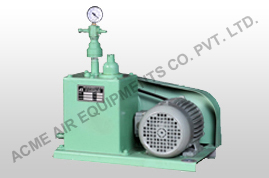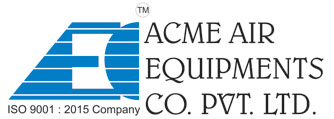Table of Contents
Efficient vacuum systems are the backbone of industries such as pharmaceuticals, food processing, electronics and chemical manufacturing. Among the various types of vacuum pumps, Oil Sealed Vacuum Pumps stand out for their reliability, efficiency and ability to achieve high vacuum levels. These pumps use oil to create an airtight seal, ensuring consistent performance even in demanding applications.
In this article, we will delve into the working principle of oil sealed vacuum pumps, explain how oil enhances vacuum creation and showcase why Acme Air Equipments is a trusted provider of these essential industrial tools?
What Is Oil Sealed Vacuum Pump?
An Oil Sealed Vacuum Pump is a type of rotary pump that relies on oil to create a tight seal between its components, ensuring minimal leakage and efficient gas compression. This technology is ideal for achieving high and ultra-high vacuum levels.
Key Features
- Oil Seal Mechanism: Enhances vacuum by sealing gaps between moving parts.
- Durable Construction: Built to handle continuous and demanding operations.
- Wide Application Range: Used in processes like freeze-drying and distillation.

Applications
- Pharmaceutical Industry: Vacuum drying and solvent recovery.
- Food Processing: Freeze-drying and vacuum packaging.
- Chemical Manufacturing: Distillation, filtration and vapor recovery.
- Semiconductors: Ensures contamination-free environments.
Working Principle of Oil Sealed Vacuum Pumps
The efficiency of oil sealed vacuum pumps lies in their ability to create a robust seal that prevents air or gas from leaking back into the system. Let’s explore how these pumps work:
Gas Inlet
- The pump begins by drawing gas or air through an inlet valve. This gas enters the compression chamber where the pumping cycle starts.
Compression and Sealing
- A rotor inside the pump spins within a stator. The rotor contains vanes that create compartments to trap and compress the gas.
- Oil is introduced into the compression chamber, creating a seal between the rotor, vanes and the stator. This oil prevents gas from escaping and ensures efficient compression.
Gas Discharge
Once compressed, the gas is expelled through the outlet valve. During this stage, the oil separates from the gas, ready for reuse in the next cycle.
Cooling and Recirculation
The oil also acts as a coolant, dissipating heat generated during compression. It is filtered and recirculated to maintain the pump’s performance and longevity.
Role of Oil in Oil Sealed Vacuum Pumps
Oil plays a critical role in the functionality of these pumps. Here’s how it enhances performance:
Creates a Perfect Seal
- The oil fills microscopic gaps between moving parts, preventing backflow and ensuring the vacuum level is maintained.
Lubricates Moving Parts
- Reduces friction between components, minimizing wear and extending the pump’s lifespan.
Cools the Pump
- Absorbs and dissipates heat generated during the compression process, preventing overheating.
Captures Contaminants
- Oil traps dust, moisture and other contaminants, ensuring clean operations.
Advantages of Oil Sealed Vacuum Pumps
High Vacuum Levels
- These pumps may achieve deeper vacuum levels compared to dry pumps, making them suitable for critical industrial processes.
Efficient Gas Compression
- The oil seal ensures efficient compression with minimal energy loss.
Cost-Effective Operation
- By reusing the same oil within a closed-loop system, operational costs are reduced.
Durable and Reliable
- Designed for continuous use in demanding environments, oil sealed vacuum pumps are built to last.
Versatility
- Suitable for a wide range of applications, from scientific research to large-scale manufacturing.
Applications of Oil Sealed Vacuum Pumps
Pharmaceutical Industry
- Uses: Vacuum drying, solvent recovery and freeze-drying.
- Benefits: Maintains sterile environments and ensures product purity.
Food Processing
- Uses: Vacuum packaging and freeze-drying for longer shelf life.
- Benefits: Preserves food quality and prevents contamination.
Chemical Manufacturing
- Uses: Distillation, filtration and vapor recovery.
- Benefits: Handles corrosive and volatile chemicals with ease.
Electronics and Semiconductors
- Uses: Degassing and vacuum coating.
- Benefits: Creates contamination-free environments for precision manufacturing.
Challenges and Maintenance Tips
While oil sealed vacuum pumps are highly reliable, proper maintenance is crucial for sustained performance.
Challenges
- Oil Contamination: Over time, oil may collect impurities that reduce efficiency.
- Heat Generation: Prolonged operation can lead to overheating without adequate cooling.
- Seal Degradation: Continuous use may wear out seals, necessitating replacement.
Maintenance Tips
- Regular Oil Changes
- Replace oil periodically to ensure optimal sealing and lubrication.
- Inspect Seals and Vanes
- Check for wear and tear and replace components as needed.
- Monitor Performance
- Use gauges to track vacuum levels and identify potential issues early.
- Clean Filters
- Keep filters clean to maintain efficient airflow and prevent contaminants from entering the system.
Why Choose Acme Air Equipments for Oil Sealed Vacuum Pumps?
As a trusted vacuum pump manufacturer in India, Acme Air Equipments has earned a reputation for delivering high-quality oil sealed vacuum pumps designed for maximum efficiency and durability.
Advanced Engineering
- Acme’s pumps feature precision-engineered components for superior performance.
Tailored Solutions
- Offers customized designs to meet specific industrial needs, ensuring seamless integration.
Rigorous Quality Standards
- Each pump undergoes stringent testing to ensure reliability in demanding applications.
Comprehensive Support
- From installation to maintenance, Acme provides end-to-end assistance for its clients.
FAQs About Oil Sealed Vacuum Pumps
Yes, with the appropriate choice of materials and oil, these pumps can manage corrosive gases effectively.
The frequency depends on the application and operating conditions. Regular monitoring is recommended.
Yes, oil sealed vacuum pumps maintain high vacuum levels and ensure clean operations when properly maintained.
Yes, Acme specializes in delivering tailored solutions to meet unique industry requirements.
Oil sealed vacuum pumps are typically used in various applications, including:
- Vacuum drying in the food and pharmaceutical industries.
- Vacuum distillation in chemical processes.
- Vacuum packaging for food storage.
- Vacuum coating in the electronics and automotive industries.
- Scientific research in laboratories where low to medium vacuum is required.
An oil-sealed vacuum pump requires regular maintenance to ensure smooth and efficient operation. Maintenance tasks typically include:
- Oil changes to prevent contamination.
- Cleaning of filters and components.
- Inspection of seals and gaskets to avoid leaks.
- Monitoring oil levels and ensuring they are within the recommended range.
Regular maintenance helps extend the lifespan of the pump and ensures consistent performance.
There are several types of oil-sealed vacuum pumps, including:
- Rotary vane vacuum pumps: Ideal for applications requiring a high vacuum level.
- Liquid ring vacuum pumps: Used for handling gas or vapor mixtures.
- Rotary piston vacuum pumps: Known for their high pumping speeds and reliability.
Each type is suited to different applications based on required vacuum levels, capacity, and the nature of the gases being pumped.
The responsibility for maintaining an oil-sealed vacuum pump typically falls to the facility maintenance team or equipment operators. In industrial settings, it’s important that designated personnel follow the manufacturer’s guidelines and conduct regular maintenance tasks to ensure the pump is functioning properly.
Several industries benefit from the use of oil-sealed vacuum pumps, including:
- Pharmaceuticals: For processes like drying, distillation, and packaging.
- Food Industry: In vacuum packing and freeze-drying applications.
- Chemical Manufacturing: For distillation, degassing, and vacuum filtration.
- Electronics Manufacturing: In vacuum deposition processes used in creating thin films.
- Laboratories: For research purposes and experiments requiring controlled vacuum environments.
The cost of an oil-sealed vacuum pump can vary depending on factors such as the pump’s capacity, brand, and features. The price depends on the specific application, capacity, and additional features required, so it’s best to get a customized quote from Acme Air Equipments, a leading oil sealed vacuum pump manufacturer and supplier in India.
Conclusion
The working principle of oil sealed vacuum pumps underscores their effectiveness in achieving high vacuum levels while ensuring reliable and cost-effective operation. By creating a robust seal, lubricating components and cooling the system, these pumps deliver unparalleled performance across industries.
When it comes to choosing a dependable solution, Acme Air Equipments stands out for its innovation. Take the next step today and partner with Acme to experience the difference.
About Author

CEO
Mr. Vishwesh Pardeshi is the CEO of Acme Air Equipments Company Pvt. Ltd., an industrial and engineering goods manufacturing company based in Ahmedabad, Gujarat (India). He has taken over the responsibility from founding Partners and Directors of the Company, and is now leading a talented group of professionals since 2020 by bringing in vast industrial and management expertise. By qualification, he holds a Bachelor Degree in Mechanical Engineering and also holds a MBA degree from reputed institutes. Under his leadership, the Company has successfully executed prestigious projects by delivering high quality and world class products from a state of the art manufacturing facility which combines CNC-enabled precision manufacturing and strong after sales support. In line with the Vision, Mission and Core Values of the Organization, Mr. Vishwesh Pardeshi continues to drive Quality, Reliability and Global Expansion at Acme Air Equipments Co. Pvt. Ltd.









